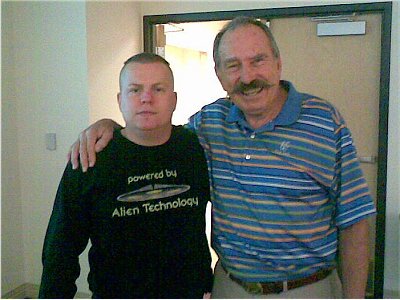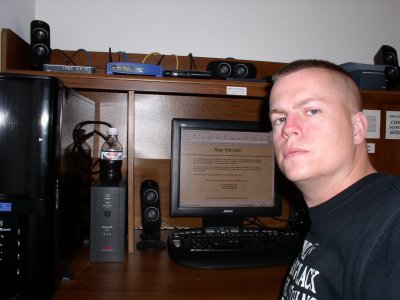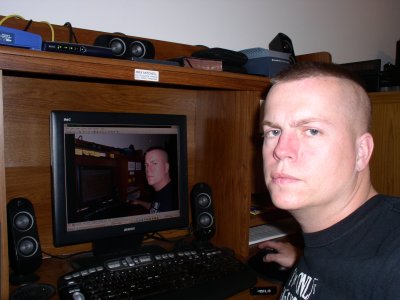
DR BUSHONG AND MYSELF AT HARTS SEMINAR
Experience Working in Health Care Memorial Hermann Southwest Hospital - Patient Transportation: As an employee I transported patients (including truama patients) from the ER (Emergency Room), ICU (Intensive Care Unit), HVI (Heart Vascular Institute), L&D (Labor and Delivery), and patient rooms to various locations in Diagnostic Imaging and then back to their rooms. (August 15th, 2007 - November 7th, 2008)
Experience Volunteering in Health Care Children's Art Project M.D. Anderson Cancer Center - Volunteer: As a volunteer, I was honored to donate my time and services to such a noble cause. I felt a great sense of pride working with LaTroy, Larry, and Gary at the Children's Art Project in the main building on Tuesday nights and at the warehouse on Friday's. (March 11th, 2008 - April 11th, 2008) click to view
Methodist Sugar Land Hospital - Volunteer: Currently I volunteer in Radiology at Methodist Sugar Land Hospital where I transport patients to the Diagnostic Imaging Department, help staff prepare the patients for their exams, observe the exams, and then transport the patients back to their rooms. (December 22nd 2007 - Present)
Saint Luke's Sugar Land Hospital - Volunteer: Currently I am technically a volunteer in Radiology at Saint Luke's Sugar Land Hospital but have not been in quite some time where I transport patients to the Diagnostic Imaging Department, help staff prepare the patients for their exams, observe the exams, and then transport the patients back to their rooms. (December 19th 2007 - Present)
Membership in Local Organizations ASRT - The American Society of Radiologic Technologists (2011 - Present)
HARTS - Houston Area Radiologic Technologists Society (2008 Only)
TSRT - Texas Society of Radiologic Technologists (2009 Only)
BAMIS - Bay Area Medial Imaging Society (2008 Only)
SWIC - South West Imaging Council (2008 - Present)
Notable Offices Held Treasurer - Southwest Imaging Council 2010-2011
Secretary - Southwest Imaging Council 2009-2010
Student Senate - UTMDACC SHP Sophomore Year
Current Certifications CPR Certified - American Heart Association
Radiologic Technologist, R.T.(R)(ARRT)
Academic Scholarships Awarded George Foundation Scholarship - 2009 in the amount of 1000.00 (Accepted)
SWIC Student Scholarship Award - 2009 in the amount of 500.00 (Accepted)
Science Symposium Scholarship - 2010 in the amount of 2000.00 (Declined)
EMES Student Scholarship Award - 2010 in the amount of 1000.00 (Accepted)
SWIC Student Scholarship Award - 2010 in the amount of 500.00 (Declined)
Kindler Foundation Scholarship - 2011 in the amount of 1000.00 (Accepted)
The Final Stretch Student Grant - 2011 in the amount of 2000.00 (Accepted)
SWIC Student Scholarship Award - 2011 in the amount of 500.00 (Accepted)
Past Higher Education - Cores CS-120 Concepts of Computing: Information Processing (4 Credits): This course surveys the fundamental concepts and principles of computer systems and information processing. It is intended as a first course for those interested in a general survey of the computer science and information technology field. Students will become conversant with a wide range of topics in the field, including the basics of computer hardware and software, operating systems, word processing, spreadsheets, database management, network and internet communications, security, and the impact of computers on individuals and society.
HE-275 Lifetime Health and Fitness (3 Credits): This course focuses on the relationship between fitness and achieving optimal lifelong health by introducing current health and fitness research. Topics include but are not limited to: emotional health, physical fitness, nutrition, weight management, cardiovascular health, stress management, wellness promotion and environmental health.
MTH-060 Beginning Algebra (4 Credits): This course is for the student who has not taken algebra recently, or who desires a slow-paced introduction to the subject. This is the first term of a two-term sequence in introductory algebra. Topics include a selective review of arithmetic, tables and graphs, signed numbers, problem solving, linear equations, ratio and proportion, and unit analysis.
WR-121 English Composition: Exposition & Introduction to Argument (3 Credits): This is the fundamental course for all writing students that introduces students to the conventions of academic writing. It emphasizes defining and developing a significant topic and using principles of clear thinking to support an assertive thesis. Students should understand their subject matter, audience, purpose, and point-of-view, and demonstrate that understanding through the organization and development of their essays. Students should analyze and evaluate other writers' work to sharpen their critical abilities as readers and writers. Because some students may go directly from WR 121 to WR 123, instructors will assign at least one argumentative essay and introduce basic principles of argumentation and research.
Recent Higher Education - Cores ARTS-2356 Photography I (3 Credits): An introduction to basic photographic processes including black and white film processing and printing. The student will examine various aesthetic approaches to photographing as well as some history of photography. This course will emphasize aesthetic aspects of photography such as design and composition, as well as content. This is a Core Curriculum Course.
BIOL-1406 General Biology I (4 Credits): Discussions focus on biological chemistry, biological processes, cellular morphology, metabolism, genetics and molecular biology. This is a Core Curriculum Course.
BIOL-2401 Anatomy and Physiology I (4 Credits): Study of the structure and function of human cells, tissues, and organ systems including integumentary skeletal, muscular, and nervous systems. This is a Core Curriculum Course.
BIOL-2402 Anatomy and Physiology II (4 Credits): Continuation of Anatomy and Physiology I including the circulatory, respiratory, digestive, excretory, reproductive and endocrine systems. This is a Core Curriculum Course.
CHEM-1405 Introductory Chemistry I (4 Credits): A general introduction to the properties of matter. Topics include atomic structure, energy, chemical bonding, reactions, gas laws and elementary thermodynamics. This is a Core Curriculum Course.
ENGL-1302 Composition II (3 Credits): A more extensive study of the skills introduced in English Composition I with an emphasis on critical thinking, research and documentation techniques, and literary and rhetorical analysis. This is a Core Curriculum Course.
GOVT-2301 American Government: National, State, and Local I (3 Credits): A study of theories of American democracy and other ideologies ,United States and Texas constitutions, federalism, state and local government, political economy, political socialization and public opinion, the media, interest groups, and political parties and elections. This is a Core Curriculum Course.
GOVT-2302 American Government: National, State, and Local II (3 Credits): A study of the executive, legislative, and judicial branches of government at both the national and state levels; economic and regulatory policy; social policy; civil liberties and civil rights policy; and foreign policy. This is a Core Curriculum Course.
GUST-0170 First Year College Experience (1 Credit): This course incorporates modules that are designed to facilitate the use of library databases in conducting research, planning and setting educational objectives, lifelong career assessment and decision-making, financial aid, tutoring and student support services, enabling the student to maximize the use of college resources.
GUST-1270 College and Career Planning (2 Credits): This course is designed to prepare students for the demands of college and for success in the world of work. The course emphasizes setting priorities, time management, effective listening, note-taking, concentration techniques, retention of information, book analysis and comprehension techniques and test-taking skills.
HIST-1301 United States History to 1877 (3 Credits): The American nation from the English colonization to the close of the Civil War through Reconstruction. This is a Core Curriculum Course.
HIST-1302 United States History after 1877 (3 Credits): The American nation from the end of the Reconstruction Era to the present. This is a Core Curriculum Course.
MATH-0308 Elementary Algebra (3 Credits): Topics include real numbers, basic geometry, polynomials, factoring, linear equations, and inequalities quadratic equations, and rational expressions. This is a Developmental Course.
MATH-0312 Intermediate Algebra (3 Credits): Topics include factoring techniques, radicals, algebraic fractions, complex numbers, graphing linear equations and inequalities, quadratic equations, system of equations, graphing quadratic equations, and an introduction to functions. This is a Developmental Course.
MATH-1314 College Algebra (3 Credits): Topics include quadratics, polynomial, rational, logarithmic and exponential functions, system of equations, progression, sequences and series, matrices and determinants. This is a Core Curriculum Course.
PHIL-1301 Introduction to Philosophy (3 Credits): This course is a theoretically diverse introduction to the study of ideas, including arguments and investigations about abstract and real phenomena, particularly in the areas of knowledge, ethics, and religion. This is a Core Curriculum Course.
PHYS-1305 Physics for Health Sciences (3 Credits): Topics include physical mechanics applied to the skeletal frame, gravity and blood circulation, friction at body joints, hydrostatic change of blood pressure, heat transfer in humans, thermodynamics of biological systems, principles of electromagnetic radiation with respect to the inner body, and electrical hazards in patient care areas. This is a Core Curriculum Course.
PSYC-2301 Introduction to Psychology (3 Credits): A survey of the basic principles underlying human behavior and mental processes. Emphasis will be placed on major areas of study in the field of psychology, such as motivation, development, thought processes, and personality. This is a Core Curriculum Course.
SPCH-1311 Fundamentals of Speech (3 Credits): A survey course in the basic principles of oral communication. Includes the study of the use of the body and voice, the speaker-listener relationship, and preparation and delivery of platform speeches. This is a Core Curriculum Course.
University Education - First Semester DI 2361 - Clinical Education I (3 Credits):
DI-2331 Anatomy & Positioning I (3 Credits):
DI-2301 Pinciples of Radiation Exposure 1 (3 Credits):
DI-4101 Radiation Safety and Protection (3 Credits):
DI-1200 Intro to Radiologic Sciences (3 Credits):
University Education - Second Semester DI 2362 - Clinical Education II (3 Credits):
DI-2332 Anatomy & Positioning II (3 Credits):
DI-2342 Pinciples of Radiation Exposure II (3 Credits):
DI-2221 Patient Care in Radiologic Sciences (2 Credits):
HS-4110 Diversity and Cultural Competence (1 Credit):
University Education - Third Semester DI 2363 - Clinical Education III (3 Credits):
DI 2333 - Radiographic Anatomy and Positioning III (3 Credits):
DI 3350 - Imaging Pathology (3 Credits):
DI 3241 - Imaging Diverse Populations (2 Credits):
University Education - Fourth Semester DI 2364 - Clinical Education IV (3 Credits):
DI 2334 - Radiographic Anatomy and Positioning IV (3 Credits):
DI 3343 - Quality Management in Radiology (3 Credits):
DI 4304 - Sectional Anatomy (3 Credits):
HS 4100 - Health Care Ethics (1 Credit):
University Education - Fifth Semester DI 3362 - Clinical Education V (3 Credits):
DI 4350 - Intro to Computed Tomography (3 Credits):
DI 2200 - Intro to Special Modalities (2 Credits):
DI 3342 - Digital Imaging (3 Credits):
RT 4210 - Radiation Biology (2 Credits):
University Education - Sixth Semester DI 3363 - Clinical Education VI (3 Credits):
DI 3200 - Capstone Registry Review (2 Credits):
HS 4111 - Medical Law (1 Credit):
University Education - Seventh Semester DI 4300 - Research Teniques in Radiologic Science (3 Credits):
DI 4361 - Magnetic Resonance Imaging Physics I (3 Credits):
DI 4364 - MRI of the Extremeties (3 Credits):
DI 4390 - MRI Internship I (3 Credits):
University Education - Eighth Semester DI 4301 - Research Project in Radiologic Science (3 Credits):
DI 4363 - Magnetic Resonance Imaging Physics II (3 Credits):
DI 4366 - MRI of the Chest, Abdomen, and Pelvis (3 Credits):
DI 4391 - MRI Internship II (3 Credits):
University Education - Ninth Semester DI 4365 - Special Topics and Future Directions in MRI (3 Credits):
DI 4362 - MRI of the Nervous System (3 Credits):
DI 4367 - MRI Comprehensive Review (3 Credits):
DI 4392 - MRI Internship III (3 Credits):
Educational Objectives Currently: I am attending class at The University of Texas MD Anderson Cancer Center's School of Health Professions and am enrolled into the Diagnostic Imaging Program with an emphasis on Magnetic Resonance Imaging. During my next semester break before finishing up my last semester I will obtain my Basic Life Support Instructor Certification from the American Heart Association. Upon graduation my goal is to enter the Computed Tomography Certificate program at Houston Community College and obtain my CT Certification before entering the job market. While gaining valuable work experience I plan to take classes at Midwestern State University where I will obtain my Master's Degree in Radiologic Science with an emphasis on Administration. My long term goal is to obtain my doctorate in Education.
Experience in Management I worked as a Concession Supervisor for about a year at Act III Theaters, Afterward I owned and operated a US Mail Contract for two years, then became an assistant manager at Disney Character Warehouse for a short time, and eventually accepted a General Manager possition for a Hickory Farms store. I currently run a twelve-year-old home based business. In short, I am honest, reliable, trustworthy, and have the mental capacity for the job.
Computers and Technology Proficient with these Microsoft Office Programs:
- Microsoft Office Word (Versions: 95-2003)
- Microsoft Office Excel (Versions: 95-2003)
- Microsoft Office Publisher (Versions: 95-2003)
- Microsoft Office PowerPoint (Versions: 95-2003)
Advanced with these 16-bit Operating Environments:
- Microsoft Windows 95
- Microsoft Windows 98
- Microsoft Windows ME
Advanced with these 32-bit Operating Systems:
- Microsoft Windows NT 2000 (N2K)
- Microsoft Windows XP Home Edition
- Microsoft Windows XP Professional
Advanced with these 64-bit Operating System:
- Microsoft Windows XP Professional x64 Edition
- Microsoft Windows Vista Professional x64 Edition
- Microsoft Windows 7 Professional x64 Edition
Proficient with these 64-bit Linux Distro's:
- Linux Ubuntu x64 Edition with Unity Interface
- Linux Mint x64 Edition with Cinnamon Interface
- Linux Solyd x64 Edition with KDE Interface
And If I Don't Already Know It I Can Learn It!
I Am Up For The Challenge!
Last Updated: 2013-10-18

